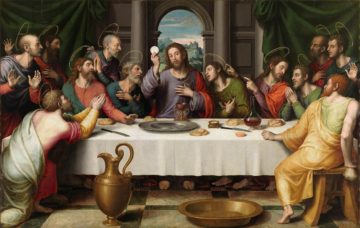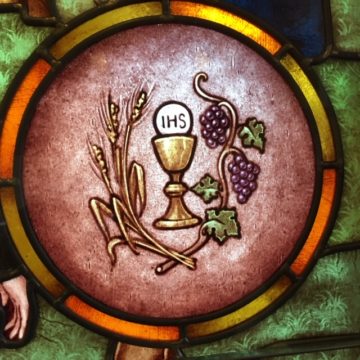This coming weekend we prayerfully give our attention to The Solemnity of the Most Holy Body and Blood of Christ. Fr. Paul Gallagher, OFM offers a Scriptural Reflection. This content is edited by Franciscan Sister of Christian Charity Sister Anne Marie Lom and Joe Thiel. The excerpts from the Sunday readings are prepared by Joe Thiel. To read or download the complete pdf with excerpts for your prayer, please click here: Franciscan Gospel Reflection June 6 2021 . Excerpts are from the Lectionary for Mass for Use in the Dioceses of the United States of America, second typical edition © 2001, 1998, 1997, 1986, 1970 Confraternity of Christian Doctrine, Inc., Washington, DC. Used with permission. All rights reserved. No portion of this text may be reproduced by any means without permission in writing from the copyright owner. Images: The Last Supper – The Collection – Museo Nacional del Prado (museodelprado.es)
Mark 14:12-16, 22-26
On the first day of the Feast of Unleavened Bread, when they sacrificed the Passover lamb, his disciples said to him, “Where do you want us to go and prepare for you to eat the Passover?” He sent two of his disciples and said to them, “Go into the city and a man will meet you, carrying a jar of water. Follow him. Wherever he enters, say to the master of the house, ‘The Teacher says, “Where is my guest room where I may eat the Passover with my disciples?”‘ Then he will show you a large upper room furnished and ready. Make the preparations for us there.” The disciples then went off, entered the city, and found it just as he had told them; and they prepared the Passover.
While they were eating, he took bread, said the blessing, broke it, and gave it to them, and said, “Take it; this is my body.” Then he took a cup, gave thanks, and gave it to them, and they all drank from it. He said to them, “This is my blood of the covenant, which will be shed for many. Amen, I say to you, I shall not drink again the fruit of the vine until the day when I drink it new in the kingdom of God.” Then, after singing a hymn, they went out to the Mount of Olives.
Background:
There is general agreement among scripture scholars that John’s chronology of the events of Jesus’ passion and death is more accurate than that which is found in the synoptic gospels. Jesus died on the afternoon before the celebration of Passover began, and his body was removed from the cross before sunset as the Jews gathered to begin that sacred meal. This means that Jesus’ final meal with his disciples was not a Passover meal according to the feast date.
However, when Mark and the early Christians gathered to remember that last meal with Jesus, they understood it as a kind of new Passover. The celebration of Passover was not just a remembering of what had happened one night in Egypt. By their yearly celebration of Passover, the Jews believed that they were once again making present that night when Yahweh acted on their behalf to turn them from being Egyptian slaves to being God’s chosen people. Now the early Christians believed that by their celebration of Jesus’ last meal with them, they were renewing that new relationship with Jesus and God that Jesus had begun at the holy meal. So, when they remembered and retold that event, it was described as a Passover meal. It was a way for his followers to enter again into Jesus’ last meal with his disciples and the relationship that was founded in that celebration. Their understanding and appreciation grew as they participated in the ritual itself and reflected on its meaning. The condensed description of Jesus’ celebration of the Passover with his disciples that appears as our text reflects a much deeper understanding of years of reflection on their old traditions, their remembrance of Jesus, and their new experiences as people who believed Jesus to be the Messiah.
Reflection Questions:
- How aware are you of the kinds of foods you eat? How aware are you of when your body is hungry or thirsty? How aware are you of the effects that certain kinds of foods have on you?
- Can you recall a time when you have used a meal to help communicate to another how you felt about that person?
- When you think of Jesus having eaten with others in the gospels, which stories come to mind? What kind of message is being communicated by those meals?
- In the first part of this gospel, Jesus tells his disciples how to find the room that they should prepare for the Passover. The events unfold just as Jesus had predicted. What is being revealed here? Why?
- Why do you think Jesus did not use something else, like pebbles and wildflowers, to represent his body and blood? What would have been the benefit of pebbles and wildflowers over bread and wine? What would be missing?
- If you consider the Eucharist as an expression of God’s desire, what is being communicated to you?
- What are you communicating by standing before the person holding the host with your hands outstretched?
- Can you take some time to talk to God about your thoughts and feelings around the Eucharist, or about this feast, or about your own experience of your body and blood?




